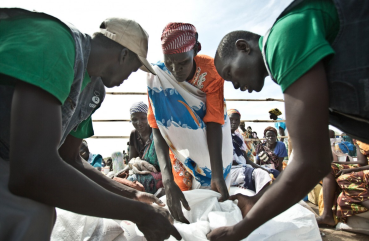S. Sudan nears breaking point as inflation increases: Oxfam
April 21, 2015 (BOR) – As South Sudan’s unresolved conflict enters its 16th month, the country is drawing nearer to its breaking point given the soaring inflation, conflicts and breaking markets in the country, an aid agency warned on Tuesday.

“What we’re seeing now is families that have spent the past year and a half living on the edge – many have exhausted their food stocks, been displaced from their homes, missed opportunities to plant and farm, and now the economy is showing the strain of a year and a half of conflict,” Drew’s statement reads in part.
South Sudanese areas affected by the conflict have experienced “drastic increases in food prices” Drew said, citing a 300% increase in cereal prices in Upper Nile, Unity and Jonglei states last February.
According to the Oxfam official, the South Sudanese pound is also depreciating rapidly. The official rate remains at 3.2 pounds to the US dollar, yet parallel market rates are as high as 7 pounds to the dollar, which fluctuates on a regular basis.
“This is increasing the cost of regional food imports and putting pressure on already stretched household budgets,” said Drew.
“Many people can no longer afford to buy food and other basic essentials; trade in markets has been disrupted, or in many instances, markets have been damaged or destroyed altogether,” she added.
At least 2.5 million people are facing severe levels of hunger, aid agencies say, with the Famine Early Warning Systems Network (FEWSNET) predicting that more than a million people are likely to face severe starvation by June this year.
“As the rains set in, reaching people who are desperately in need of aid will become more and more difficult. It’s vital that aid reaches people not just in the camps on UN bases but the millions in need spread out across the country, especially in conflict affected states,” said Drew.
“It’s hard to describe just how difficult it is to provide humanitarian assistance here. Insecurity due to protracted fighting and poor roads mean that in many places agencies have to fly absolutely everything in, often to airstrips that are easily bogged down by mud and rain – so getting food and essential items in before the rains start is an urgent priority,” she added.
Tens of thousands of people have been killed and nearly two million displaced since violence broke out in the South Sudanese capital, Juba in mid-December last year.
(ST)
